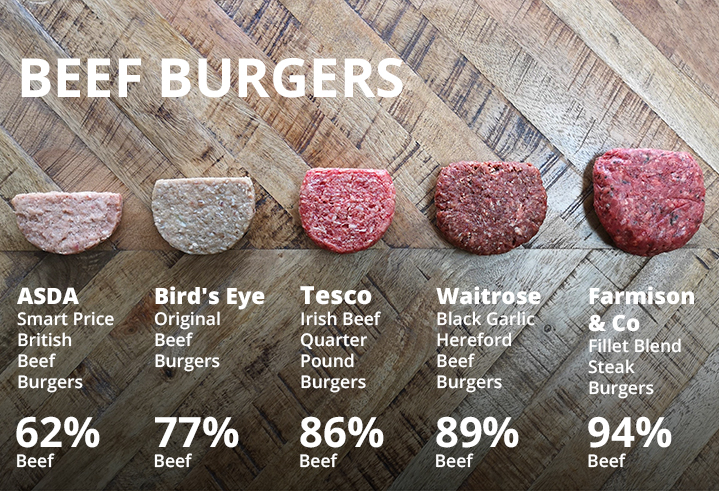How much meat is in your burger?

It's that time of year again where we find any excuse to crack out the BBQ. Weekend plans? BBQ. Weekday dinners? BBQ. As soon as the sun makes an appearance, us Brits are prepared with tongs in hand, ready to get the BBQ fired up.
But with a fridge stacked full of burgers for most of the Summer months - do you actually know what ingredients are in your much-loved BBQ items?
A new study we've recently undertaken at Farmison & Co, analyses a variety of burgers on the market this Summer and offers expert advice on what consumers should be looking out for when throwing their family favourites in the basket.
Our meat experts have compared a variety of beef burgers and chicken burgers to reveal the following for each category:
- The % of meat content in each item
- The other ingredients that make up the products
- Each item before and after being cooked
Beef Burgers

Chicken Burgers

Aren't all my beef burgers just made of beef?
The simple answer to this is no. When looking at the product information on the back of meat packaging, we're shown what percentage of that product is made of meat - which raises the question of ''What makes up the other X%?'
When taking a closer look at the labels, we're often faced with a list of additional ingredients - but which ones should we be keeping an eye out for?
Jeff Baker, Executive Development Chef at Farmison & Co explains;
- Water: If water is high up in the ingredients list of a product, then that's a red flag. Sometimes a little water is needed, however, you shouldn't be paying for a large quantity of water in a meat product. The higher it is on the ingredients list, the more there is in the product.
- Rusk: Similar to water, if you find rusk high up on the ingredients list it means that there is a high amount of this within the product. Rusk can be greyish in appearance, therefore when raw products (e.g. beef burgers) are more reddish in colour, this usually indicates that less rusk has been used. Ideally, if you're after a better quality burger, it's best to look out for meat that has a lower rusk content.
- Flavouring: You'll often find 'natural flavouring' on packets, which tends to mean fresh herbs, carefully selected spices etc. However, something to be aware of is the word 'FLAVOURING' used on its own, as this is pretty questionable - what exactly is this flavouring; is it derived from natural flavour extracts or is it chemically created?
What should we be looking for?
Did you know:
- When you cook meat which has had a lot of other ingredients added to it - once cooked, the inside can sometimes turn a vibrant pink with an acidic smell. This is a sign that the product might be overworked, poor quality, or can even indicate that it's an older product. When it's cooked, many would assume that it would go more greyish, but actually, it will go pink, almost a deep red, purple colour, because of the chemical reaction between all the additives and protein cells.
- The shorter the list of ingredients is, the less has been added to the product - therefore in most cases, would indicate that it's a more natural product.
- There's a myth around E numbers: they're not all bad but it's hard to know what to look for because there's a lot of them - 100sover 700 in fact! Supermarkets have stepped away from using them and instead, list the full ingredient like 'Sodium Metabisulphite' - which is an E number. However, for example, E300, which you might read as a 'nasty' is actually Vitamin C.
- Look out for the muscles used to create the burger such as chuck, fillet or short rib. If it's not named it's probably from a generic mix taken from different parts of the animal, for value rather than flavour
John Pallagi, Co-founder of Farmison & Co comments: "As outlined in our study, there are a few key things we believe Brits should be considering (and looking out for) when selecting your burgers. Ultimately, we're keen to encourage consumers to be more curious about what they're eating and what is going into their foods. Gaining this deeper understanding and asking these questions around what you're eating is so important and can often be quite eye-opening - therefore we want to raise awareness around doing so.
"At Farmison & Co our mission is to get the nation to Eat Better Meat - less processed foods and more quality, nutrient-rich meat which has been ethically reared from free-range, grass-fed & happy animals."
At Farmison & Co, we have a wide range of burgers available. To shop the range, click here or read about our quest for the perfect burger.
